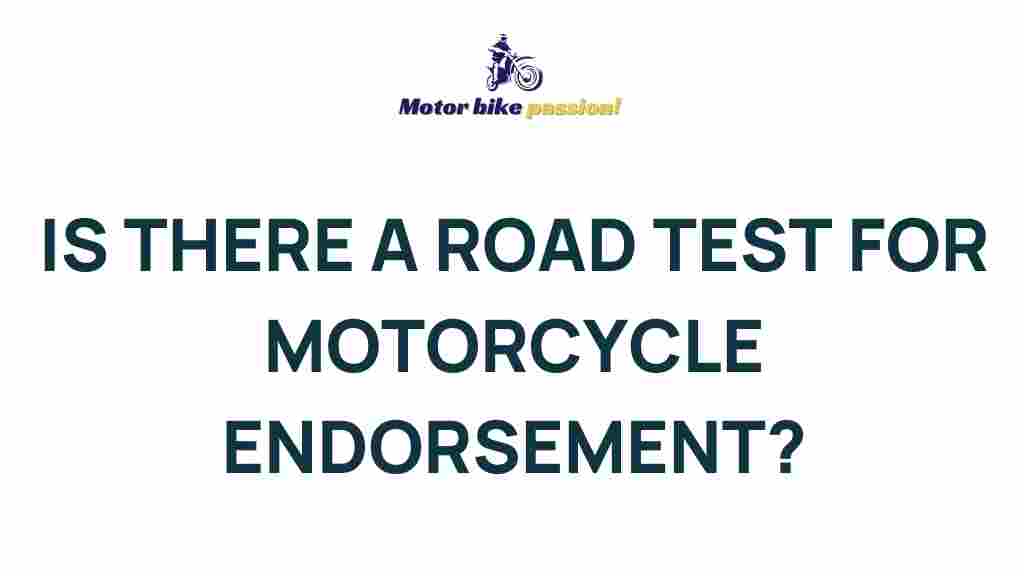Uncover the Secrets of the Motorcycle Endorsement Test
Getting your motorcycle endorsement is an exciting milestone for any motorcycle enthusiast. It signifies not just your ability to operate a motorcycle, but also your commitment to safety and responsible riding. In this comprehensive guide, we will explore everything you need to know about the motorcycle endorsement, including the requirements, skills needed, preparation tips, and the road test itself. Whether you are a beginner or looking to brush up on your skills, this article is your ultimate resource.
Understanding the Motorcycle Endorsement
A motorcycle endorsement is an official addition to your driver’s license that allows you to legally operate a motorcycle. Each state has its own requirements and regulations regarding motorcycle endorsements, so it’s essential to understand what is needed in your area.
- Legal Requirement: Riding without a motorcycle endorsement can lead to fines and legal issues.
- Safety Emphasis: The endorsement process emphasizes safety, ensuring that riders are well-prepared to handle a motorcycle.
Requirements for Obtaining a Motorcycle Endorsement
Before you can take the motorcycle road test, you must meet certain requirements:
- Age: Most states require you to be at least 16 years old.
- Driver’s License: You must possess a valid driver’s license.
- Knowledge Test: Many states require a written test on motorcycle laws and safety.
- Training Course: Completing a motorcycle safety course can sometimes waive the road test requirement.
Preparing for the Motorcycle Endorsement Road Test
Preparation is key to successfully passing the motorcycle endorsement test. Here are some essential tips to help you get ready:
1. Take a Motorcycle Safety Course
One of the best ways to prepare is by enrolling in a motorcycle safety course. These courses cover vital skills, including:
- Basic motorcycle control
- Traffic laws and regulations
- Defensive riding techniques
- Emergency maneuvers
Completing a course can also provide you with valuable knowledge and may exempt you from the road test in some states.
2. Practice Riding
Nothing beats hands-on experience. Spend time practicing your riding skills in a safe environment. Focus on:
- Starting and stopping smoothly
- Turning and leaning into corners
- Controlling speed and braking
- Using signals and mirrors effectively
3. Study the Manual
Familiarize yourself with your state’s motorcycle manual. This document will provide crucial information on:
- Motorcycle laws in your state
- Road signs and signals
- Safety requirements and recommendations
4. Know the Road Test Requirements
Each state has specific requirements for the motorcycle road test. Generally, you will need to demonstrate:
- Basic control of the motorcycle
- Turning and maneuvering through obstacles
- Stopping and starting safely
- Proper signaling and lane changing
5. Check Your Gear
Before the test, ensure you have the proper safety gear, including:
- Helmet (DOT-approved)
- Gloves
- Jacket and pants made from durable materials
- Boots that cover your ankles
What to Expect During the Road Test
The motorcycle endorsement road test typically consists of two parts: a skills test and a road test. Here’s a breakdown of what to expect:
1. Skills Test
The skills test evaluates your ability to control the motorcycle. You may be asked to perform:
- Basic maneuvers such as tight turns, figure eights, and stopping quickly.
- Obstacle avoidance techniques.
- Proper use of signals during maneuvers.
2. Road Test
If you pass the skills test, you will proceed to the road test. During this part, you’ll be evaluated on:
- Your ability to obey traffic laws.
- Safe interaction with other vehicles and pedestrians.
- Use of mirrors and signals when changing lanes or turning.
Tips for Success on the Road Test
To increase your chances of passing the motorcycle endorsement road test, consider the following tips:
- Stay Calm: Nerves can affect your performance. Take deep breaths and focus on the task.
- Listen to Instructions: Pay attention to what the examiner tells you and ask for clarification if needed.
- Practice Defensive Riding: Always be aware of your surroundings and anticipate the actions of other drivers.
- Follow the Rules: Obey all traffic signals and signs, and use your signals appropriately.
Troubleshooting Common Issues
Even with preparation, some riders may encounter challenges. Here are some common issues and how to troubleshoot them:
1. Nervousness
If you feel anxious about the test, practice relaxation techniques such as:
- Visualization: Imagine yourself successfully completing the test.
- Breathing exercises: Inhale deeply and exhale slowly to calm your nerves.
2. Skills Gaps
If you struggle with specific skills, consider:
- Taking additional practice sessions.
- Requesting feedback from an experienced rider or instructor.
Conclusion
Obtaining your motorcycle endorsement is a rewarding journey that emphasizes safety and skill. By understanding the requirements, preparing thoroughly, and practicing diligently, you can confidently approach the motorcycle road test. Remember, riding is not just about obtaining a license; it’s about ensuring your safety and the safety of others on the road. For more information, visit your local Department of Motor Vehicles or check reputable resources such as Motorcycle Safety Foundation.
Good luck on your journey to becoming a licensed motorcycle rider, and ride safely!
This article is in the category Safe Driving and created by MotorBikePassion Team
